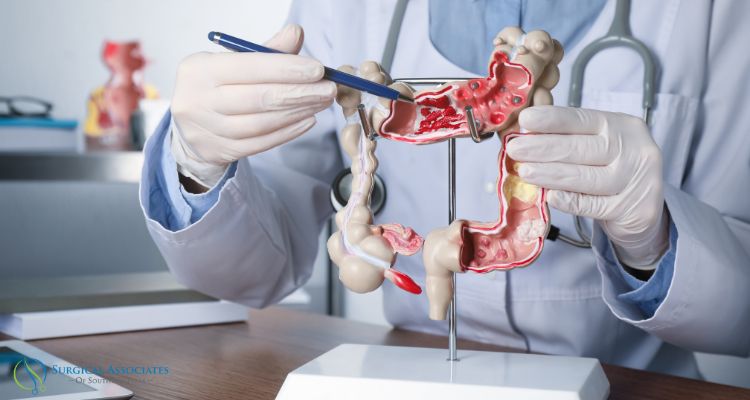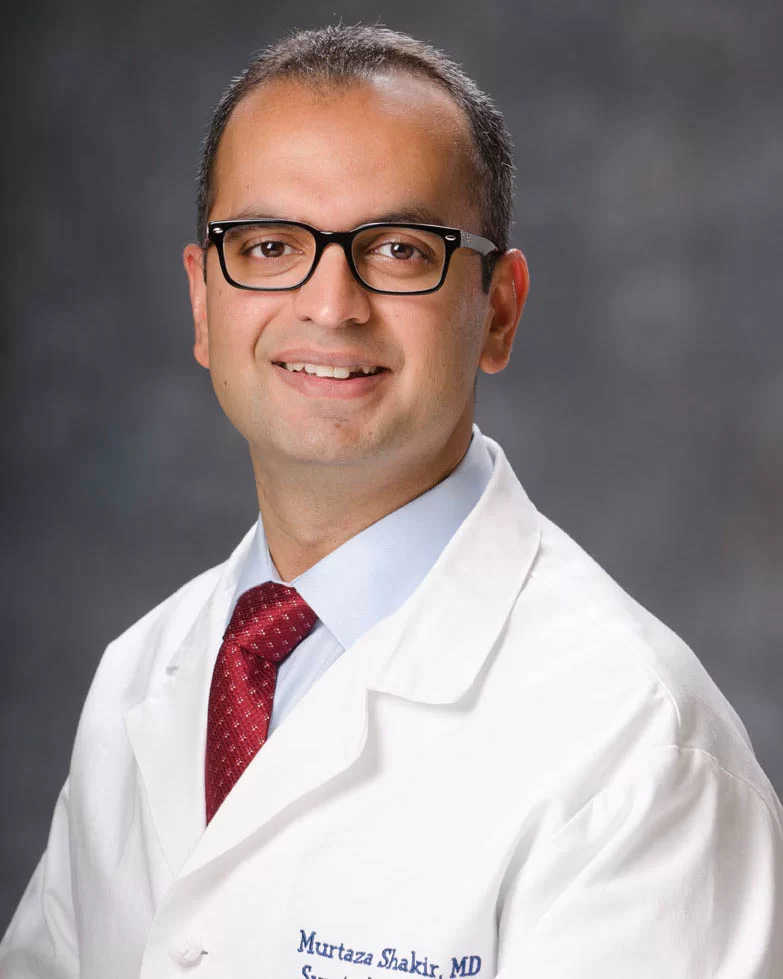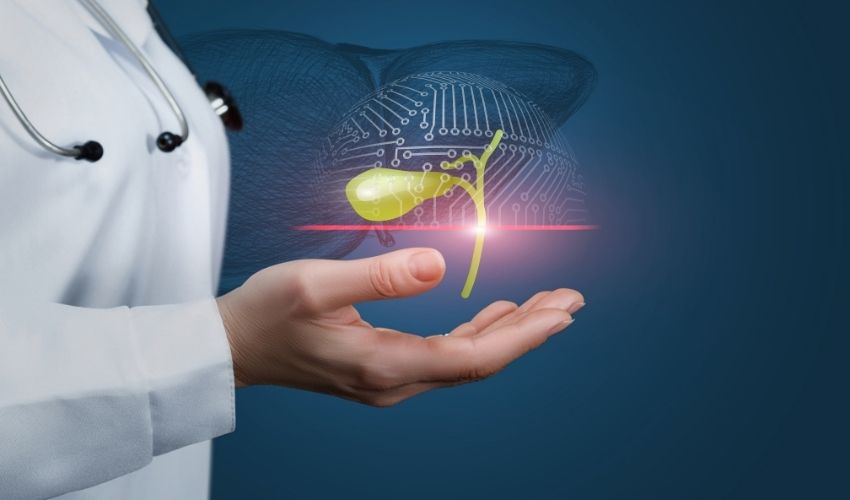Appendicitis and Appendix Removal Surgery in Houston
When appendicitis strikes, timely diagnosis and expert surgical care are crucial to avoid complications. At Surgical Associates of Southern Texas, we specialize in appendicitis treatment and appendix removal surgery (appendectomy), providing safe and effective solutions to patients in Houston and surrounding areas. With advanced techniques and compassionate care, we are here to help you recover quickly and return to your daily life.
The appendix is a small, finger-sized organ situated in the lower right abdomen, extending from the large intestine. Although it may have played a role in digestion for plant-eating animals, in humans, the appendix is largely considered a vestigial organ, meaning it no longer serves a vital function.
What is Appendicitis?
Appendicitis is the inflammation of the appendix, a small pouch attached to the intestine on the lower right side. While the appendix’s precise function isn’t fully understood, some believe it may assist in recovery from intestinal infections or inflammation, such as diarrhea. However, since the body functions perfectly well without the appendix, it is often removed when it becomes inflamed. This procedure, known as an appendectomy, is a common emergency surgery that our experts in Greater Houston are highly skilled in performing.

| Sign/Symptom | Description |
|---|---|
| Abdominal Pain | The pain often begins near the belly button and then moves to the lower right side of the abdomen. |
| Appetite Loss | Loss of appetite which may be accompanied by nausea or vomiting. |
| Fever and Chills | A low-grade fever that can become higher if the appendix ruptures. |
| Bloating and Gas | Swelling of the abdomen. |
| Constipation or Diarrhea | Changes in bowel habits, particularly diarrhea. |
| Nausea and Vomiting | Can develop shortly after the abdominal pain begins. |
| Difficulty Passing Gas | Challenges in expelling gas from the digestive system. |
Understanding Appendix Pain and Expert Care from Dr. Murtaza Shakir
Appendix pain, often caused by appendicitis, is a condition requiring prompt and expert medical attention. Dr. Murtaza Shakir, a highly regarded surgeon with certifications in General Surgery and Complex General Surgical Oncology from the American Board of Surgery, is dedicated to providing advanced care for patients experiencing appendix-related issues. With years of training and experience, Dr. Shakir specializes in minimally invasive surgical techniques, ensuring precise treatment and faster recovery for his patients.
About Dr. Murtaza Shakir
Dr. Shakir brings exceptional expertise to the field of surgery. He completed his residency at Riverside Methodist Hospital in Columbus, Ohio, followed by a fellowship in Surgical Oncology at the prestigious University of Pittsburgh Medical Center (UPMC). With extensive training in laparoscopic and robotic-assisted procedures, Dr. Shakir offers cutting-edge solutions tailored to each patient’s needs, including appendix removal surgery (appendectomy).
Appendix Pain: Symptoms and When to Seek Care
Appendix pain is often the first warning sign of appendicitis, a potentially serious condition. Dr. Shakir emphasizes the importance of recognizing key symptoms early to avoid complications:
Common Symptoms of Appendicitis:
- Pain Location: Begins around the belly button and shifts to the lower right abdomen, also known as McBurney’s point.
- Radiating Pain: May extend to the back, hip, or, in rare cases, the left side of the abdomen.
- Additional Signs: Nausea, vomiting, fever, chills, bloating, and loss of appetite.
For women, appendicitis symptoms can sometimes be mistaken for gynecological issues such as ovarian cysts or pelvic infections. Dr. Shakir’s advanced diagnostic approach ensures accurate identification and timely treatment.
Can Appendix Pain Come and Go?
In some cases, appendix pain may seem intermittent during the early stages of appendicitis. However, untreated appendicitis typically progresses, leading to constant and severe pain. Dr. Shakir advises patients to seek immediate medical attention if they experience persistent or recurring abdominal discomfort.
Expert Appendix Removal Surgery with Dr. Shakir
Dr. Shakir specializes in minimally invasive appendectomy, a surgical procedure to remove the appendix. Using advanced laparoscopic and robotic-assisted techniques, he ensures:
- Smaller Incisions: Leading to less pain and minimal scarring.
- Faster Recovery: Most patients can return to normal activities within 1-3 weeks.
- Enhanced Precision: Advanced tools ensure effective and safe surgery.
Dr. Shakir’s approach to appendix removal combines his expertise with state-of-the-art technology, providing patients with the highest standard of care.
Why Choose Dr. Shakir for Appendicitis Treatment?
- Board-Certified Expertise: Credentials in both General Surgery and Complex General Surgical Oncology.
- Minimally Invasive Techniques: Focused on reducing recovery time and improving patient outcomes.
- Comprehensive Care: From diagnosis to post-operative follow-up, Dr. Shakir ensures a seamless experience.
- Advanced Training: Fellowship-trained at one of the top surgical oncology programs in the country.
- Patient-Centered Approach: Personalized treatment plans tailored to each patient’s unique condition.

Schedule A Consulttaion Today For Appendicitis Surgery in Katy or Sugar Land
For more information on our procedures or if you are interested in scheduling an appointment please reach us at our Katy or Sugar Land location, or contact Dr. Shakir, a board-certified General Surgeon and Surgical Oncologist, directly. Dr. Sakir can let you know if you are a good candidate for the procedure, and can recommend any additional treatments that can help you reach your goals.
However, mentioned below our Katy, TX clinic address when looking for appendicitis surgeon near Katy, Fulshear, Richmond:
410 W Grand Pkwy S,
Suite 4D, Katy, TX 77494.
Patients looking for competent appendicitis surgeon near me from Sugar Land, TX, Stafford, Fort Bend or Greater Houston areas, can visit our below clinic location
17510 W Grand Pkwy S Ste 460
Sugar Land, TX 77479.
Patient Care

Dr. Murtaza Shakir has been ranked as one of the top doctors of General surgery in Houston, as per Houstonia
Houstonia
Our Surgeon
Board-certified General Surgeon and Surgical Oncologist
Dr. Shakir is a board-certified General Surgeon and Surgical Oncologist working in Katy and SUGAR LAND. After graduating from Medical School at Aga Khan University in Karachi, Pakistan, he ventured to complete his residency in General Surgery at the Riverside Methodist Hospital in Columbus, Ohio. He also specializes in providing the most cutting edge and personalized treatment for patients with Breast Cancer.
Specialized Surgeron
As a general surgeon he provides expert treatment of common general surgical problems like Gallbladder Surgery and Hernia Repair and complex abdominal wall reconstruction.
General Surgeon & Surgical Oncologist
Being the only Board Certified Surgical Oncologist outside of the Texas Medical Center, Dr. Shakir specializes in treatment of various Malignancies ranging from Colon, Rectal, Liver and Pancreatic cancer
Need Consultation!
713-955-9191
General Information
FAQ
More About Surgical Associates of Southern TX
Surgical Associates of Southern TX, where exceptional surgical treatments meet compassionate care. Located in Greater Houston, Texas, our esteemed team of experts is dedicated to providing you with the highest quality surgical services. From general surgery to surgical oncology, we offer a comprehensive range of procedures tailored to meet your unique needs. Whether you’re seeking treatment for appendicitis, gallbladder disease, or skin lesions, rest assured that you’re in capable hands. With convenient locations in Katy and Sugar Land, TX, scheduling a consultation with Dr. Murtaza is just a phone call away. Take the first step towards a healthier future by contacting us today.
How is Abdominal Pain related to Appendicitis?
Abdominal pain is a significant symptom of appendicitis, but it’s also a symptom associated with many other medical conditions. It’s crucial to pay attention to the nature and progression of the pain, as well as any accompanying symptoms. When in doubt, always consult with a healthcare professional to ensure timely diagnosis and treatment. Here’s a closer look:
- Onset of Pain: The initial discomfort often begins around the navel (belly button) before shifting to the lower right side of the abdomen.
- Nature of Pain: The pain typically starts as a dull ache that becomes progressively sharper over hours.
- Associated Symptoms: Besides pain, symptoms can include loss of appetite, nausea, vomiting, fever, and constipation or diarrhea.
- Positional Influence: The pain can worsen with sudden movements, coughing, sneezing, or walking.
The ACS may offer best practice guidelines on the surgical management of appendicitis, which typically involves an appendectomy (the removal of the appendix). As per American College of Surgeons “Younger patients with appendicitis are more likely to have cancer of the appendix”
What are the types of appendectomy procedures?
Two primary methods of performing an appendectomy – the traditional open appendectomy and the minimally invasive laparoscopic appendectomy.
Open Appendectomy: The Traditional Approach
How it’s done: In an open appendectomy, a single, sizable incision (usually 2-4 inches) is made in the lower right side of the abdomen. Through this opening, the surgeon can directly access and remove the inflamed appendix.
Pros:
- Proven track record: This method has been in practice for a long time and has successfully treated countless patients.
- Direct access: The larger incision provides surgeons with a clear view and ample space to work, which can be advantageous in cases with severe inflammation or complications.
Cons:
- Extended recovery: The larger incision generally means a slightly longer recovery period.
- More visible scarring: Due to the size of the incision, there’s a possibility of a more prominent scar post-surgery.
Laparoscopic Appendectomy: The Minimally Invasive Marvel
How it’s done: In a laparoscopic appendectomy, the surgeon makes several small incisions in the abdomen. Specialized surgical tools, including a camera (laparoscope), are inserted through these openings. The camera projects the internal view onto a screen, guiding the surgeon throughout the procedure.
Pros:
- Quicker recovery: As the incisions are small, patients often experience a faster recovery, getting back to daily activities sooner.
- Reduced pain: The procedure is associated with less post-operative pain, thanks to the minimal incisions.
- Minimal scarring: The tiny incisions heal with minimal to no visible scarring.
- Reduced risk of infection: Smaller wounds typically pose a decreased risk of post-surgical infections.
Cons:
- Requires specialized training: The procedure needs surgeons trained in laparoscopic techniques.
- Not always an option: In cases of a ruptured appendix or complex situations, an open procedure might be more appropriate.
Recovery time after an appendectomy.
After about 4-6 weeks, most patients fully return to their regular routines, including engaging in more vigorous activities or exercises. However, everyone’s healing journey is unique. It’s essential to remain patient and give your body the time it needs.
Testimonials
How Clients Review Our Service..
Our Blogs: General Information

What Are the First Warning Signs of Gallbladder Disease? Symptoms, Diagnosis, and Treatment Options
The gallbladder is a small but mighty organ that plays a key role in digestion by storing bile produced by the liver. When it malfunctions or becomes diseased, it can cause discomfort and...
Making the most of surgical outputs
Having one-on-one interaction with our top surgeon helps in understanding the complete surgical procedure. Whether it is for general surgery or surgical oncology, we try to ensure best surgical outputs for local and overseas patients.
Accepting Patients From Greater Houston, Katy, Sugar Land, Richmond, Fulshear Areas.
Patients visiting from the greater Houston and other areas of Texas are requested to call us for a confirming appointment. Overseas patients request us to contact us in advance for a detailed consultation.
Get Directions…….
